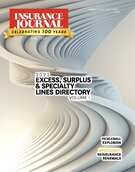Florida officials have taken strong action against two of the insurance industry’s most-detested adversaries, disbarring a notorious plaintiffs’ attorney who filed thousands of frivolous claims lawsuits and moving to revoke the license of a public adjuster that obstructed insurers in multiple claims.
The actions against attorney Scot Strems and adjuster Scott David Thomas came two weeks after the Florida Legislature approved Senate Bill 2A, a sweeping insurance reform measure, and will likely be seen as high points for a year that had witnessed six insurer insolvencies and mounting litigation losses. Florida-based insurers have complained that some lawyers and public adjusters have gamed the system in recent years, crippling carriers with millions of dollars in legal expenses.
In an action that insurers had been hoping for over the past two years, the Florida Supreme Court on Dec. 22 blocked Coral Gables claimants’ attorney Scot Strems from practicing law in the state. The court overrode a referee’s recommendation of a two-year suspension and it ordered Strems to pay more than $45,000 in costs incurred by the Florida Bar in prosecuting the investigation.
One insurance defense attorney said the disbarment shows the perils that claimants’ lawyers face when they try to engage in the mass-lawsuit filing model that Strems and a few other law firms had taken to an extreme level. An insurance industry consultant blogged that Strems’ punishment marks the “collapse of an evil empire.”
Strems in 2020 became the poster child for what many in the Florida insurance industry said was the root of the Florida property insurance problem: plaintiffs’ attorneys filing large numbers of unnecessary claims lawsuits, leading to an explosion in litigation costs for carriers.
After the Florida Bar filed its complaint against Strems in 2020, he was suspended from practice following a referee’s report. Strems appealed to the Supreme Court, as did the Bar, which urged permanent disbarment. Numerous insurance interests had filed complaints about Strems and his law firm, charging that in many cases, his firm filed multiple suits on the same claim.
The high court, which has often come down harder than a referee has recommended on lawyer discipline, landed on disbarment — but not permanently.
“Although he has certainly engaged in ethically questionable behavior, he has not demonstrated that he is not amenable to rehabilitation,” the justices wrote. “Permanent disbarment is warranted only where an attorney’s conduct indicates he or she engages in a persistent course of unrepentant and egregious misconduct and is beyond redemption.”
The court’s 37-page order shows that Strems’ violations involved far more than “the unfettered pursuit of frivolous lawsuits.” He also submitted false or misleading affidavits in two cases in which he negotiated settlements. In one case, Strems attached a purported email chain between him and opposing counsel. But he failed to include seven emails from the other lawyer that directly conflicted with Strems’ assertions in the affidavit, the court explained.
In another case, Strems’ firm represented an 84-year-old homeowner who had filed a claim after a hurricane. The woman agreed to an attorney fee of 30% of the settlement, or whatever the court awarded in fees. After Strems negotiated a $45,000 settlement, though, his firm took half of that as a fee.
In answer to the Bar’s complaint against him, Strems in 2020 denied most of the charges. In a statement to Insurance Journal, Strems’ attorney, Benedict Kuehne, said that Strems is deeply disappointed with the disbarment decision.
“For his entire career, Scot dedicated his professional endeavors to helping wronged homeowners pursue their legitimate grievances against insurance companies that refused to pay for damages to their homes,” Kuehne said. “He has never intentionally or purposely violated Bar rules. The referee, after considering all the evidence and the absence of any prior difficulties with bar rules, deemed a modest suspension as the appropriate resolution.”
Strems’ actions not only cost insurance companies, but also hurt his own clients, the court found. Between 2016 and 2018, many of his suits were dismissed because Strems and his associates missed court deadlines and willfully violated procedural rules, the court noted. One trial court judge said that the firm engaged in “blatant obstruction of justice” and practiced delaying tactics in virtually every case.
As his firm took on more and more insurance claims cases, Strems repeatedly failed to manage the growing workload or hire enough attorneys. That resulted in a number of court sanctions against the firm, often on a weekly basis.
Strems closed his law firm in 2020 but some of the lawyers with the firm formed another one. He now intends to ask the Supreme Court to reconsider the severity of the sanctions, “based on his long track record of doing the right thing under often difficult circumstances,” Kuehne said. “His prior unblemished career should merit an opportunity to prove his value to the profession and the public.”
Infamous Adjuster Could Lose License
Florida’s Department of Financial Services on Dec. 16 formally asked an administrative judge to revoke the license of Scott David Thomas, owner of Indemnity Public Adjusters, based in south Florida.
The department’s attorneys outlined nine counts charging that Thomas had violated Florida laws by repeatedly harassing insurance company adjusters and engineers, sometimes threatening them with violence and thwarting their inspections.
His actions against Citizens’ Property Insurance Corp., Tower Hill Insurance, Lloyd’s of London and QBE Specialty Insurance resulted in claims being denied altogether or delayed for months, DFS said in the proposed order filed with the Florida Department of Administrative Hearings.
Thomas’ strategy may have been to wear down insurers so that they would forget about their own property inspections and accept his fee-paid adjustment reports.
“Respondent’s repeated hostile behavior is designed to make the process inhospitable to the insurer in the hopes of securing a better claim for his client,” the DFS proposed recommended order reads.
“We agree with the recommendation. None of what he did benefitted the customer at all,” said Michael Peltier, communications director for Citizens.
Thomas’ attorney, Matthew Ladd, said that his client has done nothing wrong and his actions have held insurers accountable, resulting in full claims payments to homeowners.
Ladd filed his own proposed order to be considered by the DOAH judge. In it, he argues that Thomas asked for proof of insurance by roof inspectors in order to protect the homeowners, in case the inspector fell and was injured.
Topics Florida
Was this article valuable?
Here are more articles you may enjoy.



 Florida Insurance Costs 14.5% Lower Than Without Reforms, Report Finds
Florida Insurance Costs 14.5% Lower Than Without Reforms, Report Finds  Insurance Issue Leaves Some Players Off World Baseball Classic Rosters
Insurance Issue Leaves Some Players Off World Baseball Classic Rosters  A 10-Year Wait for Autonomous Vehicles to Impact Insurers, Says Fitch
A 10-Year Wait for Autonomous Vehicles to Impact Insurers, Says Fitch  Portugal Deadly Floods Force Evacuations, Collapse Main Highway
Portugal Deadly Floods Force Evacuations, Collapse Main Highway 



